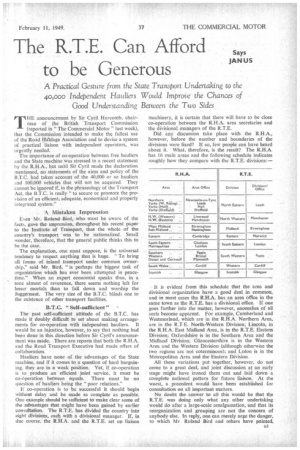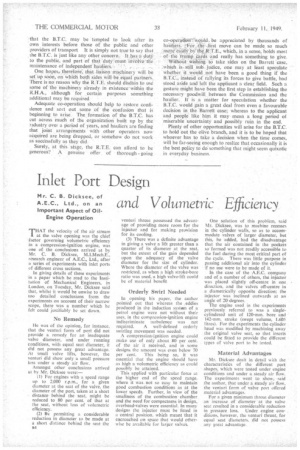The RTE, Can Afford Says to be Generous JAN US
Page 11

Page 12

If you've noticed an error in this article please click here to report it so we can fix it.
A Practical Gesture from the State Transport Undertaking to the 40,000 Independent Hauliers Would Improve the Chances of Good Understanding Between the Two Sides THE announcement by Sir Cyril Hurcomb, chairman of the British Transport Commission (reported in "The Commercial Motor" last week), that the Commission intended to make the fullest use of the Road Halalage Association and to devise a system of practical liaison with independent operators, was urgently needed.
The importance of co-operation between free hauliers and the State machine was stressed in a recent statement by the R.H.A., but until Sir Cyril made the declaration mentioned, no statements of the aims and policy of the B.T.C. had taken account of the 40,000 or so hauliers and 100,000 vehicles that will not be acquired. They cannot be ignored if, in the phraseology of the Transport Act, the B.T.C. is really "to secure or promote the provision of an efficient.; adequate, economical and properly integrated system." , A Mistaken Impression Even Mr. Roland Bird, whomust be aware of the facts, gave the impression, throughout his recent paper to the Institute of Transport, that the whole of the country's transport was. to be n.ationalized. Small wonder, therefore, that the general public thinks this to be the ease.
The explanation, one must suppose, is the universal tendency to respect anything that is heige. "To bring all forms of inland transport under common ownership," said Mr. Bird, "is perhaps the biggest task of organization which has ever been attempted in peacetime." When an expert economist speaks thus, in a tone almost of reverence, there seems nothing left for lesser mortals than to fall down and worship the Juggernaut. The very size of the B.T.C. blinds one to the existence of other transport facilities.
B.T.C. "Self-sufficient" '
The past self-sufficient attitude of the B.T.C. has made it doubly difficult to set about making arrangements for co-operation with independent hauliers. It would be an injustice, however, to say that nothing had been done in this direction before Sir Cyril's announcement was made. There are reports that both the R.H.A. and the Road Transport Executive had made offers of collaboration.
Hauliers have none of the advantages of the State machine, and if it comes to a question of hard bargaining. they are in a weak position. Yet, if co-operation is to produce an efficient joint service, it must be co-nperation between equals. There must be no question of hauliers being the "poor relations."
If co-operation is to be successful it should begin without delay and be made as complete as possible. One example should be sufficient to make clear some of the advantages that might have been gained by earlier consultation. The R.T.E. has divided the country into eight divisions, each with a divisional manager. If in due course. the R.H.A. and the R.T.E. set up liaison machinery, it is certain that there will have to be close co-operation between the R.H.A. area secretaries and the divisional managers of the R.T.E.
Did any discussion take place with the R.H.A., however, before the number and boundaries of the divisions were fixed? If so, few people can have heard about it. What, therefore, is the result? The R.H.A. has 16 main areas and the following schedule indicates roughly how they compare with the R.T.E. divisions:— It is evident from this schedule that the area and divisional organization have a good deal in common, and in most cases the R.H.A. has an area office in the same town as the R.T.E. has a divisional office. If one goes further into the matter, however, anomalies of all sorts become apparent. For example, Cumberland and Westmorland, which are in the R.H.A. Northern Area, are in the R.T E. North-Western Division; Lincoln, in the R.H.A. East Midland Area, is in the R.T.E. Eastern Division; Oxfordshire is in the Southern Area and the Midland Division; Gloucestershire is in the Western Area and the Western Division (although otherwise the two regions are. not coterminous); and Luton is in the Metropolitan Area and the Eastern Division.
All these variations put together, however, do not come to a great deal, and joint discussion at an early stage might have ironed them out and laid down a complete national pattern for future liaison. At the worst, a precedent would have been established for consultation on all important matters_ No. doubt the answer to all this would be that the R.T.E. was doing only what any other undertaking would do after a large-scale amalgamation, and that its reorganization and grouping are not the concern of anybody else_ In reply, one can merely urge the danger, to which Mr Roland Bird and others have pointed, that the B.T.C. may be tempted to look after its own interests before those of the public and other providers of transport It is simply not true to say that she B.T.C. is just like any other concern. It has a duty to the public, and part of that dutv must involve the maintenance of independent hauliers.
One hopes o therefore; that liaison machines!, will be set up soon, on which both sides will be equalpartners. There is no reason why the R.T.E. should disdain to use some of the machinery already, in existence-within the R.H.A., although for certain purposes something additional may be required Adequate co-operation should help to restore confidence and sort out some of the confusion that is beginning to arise The formation of the B.T.C. has cut across much of the organization built up by the .mlustry over a period of years, and hauliers are finding that joint arrangements with other operators now 'acquired are being dropped, or somehow do not work as successfully as they did.
Surely, at this stage, the R.T.E. can afford to be generous? A genuine offer, of thorough going
co-oper02inrWOUld;be appreciated by thousands of hauters For the first move can be made so much miire'eti§ikr bv the R.T.E , which, in a sense, holds most of the trump ettfdg and really has something to give.
Without wishing tO take sides on the Barrett 'case, which isstill sub judice, one may at least speculate
• whether it .would not have been a good thing if the B.T.C., instead of rallying its forces to give battle, had stood aside and left the applicant a clear field. Such a gesture might have been the first step in establishing the necessary.-goodwill ,between the Commission and the haulier. It is .a 'matter for speculation whether the B.T.C. would gain a great deal from even a favourable decision in. the 'Barrett case; whereas to the applicant and people like him it may mean a long period of miserable uncertainty and possibly ruin in the end.
Plenty of other opportunities will arise for the B.T.C. to hold out the olive branch, and it is to be hoped that whoever has to take a decision when the time comes, will be far-seeing enough to realize that occasionally it is the best policy to do something that might seem quixotic in everyday business.


























